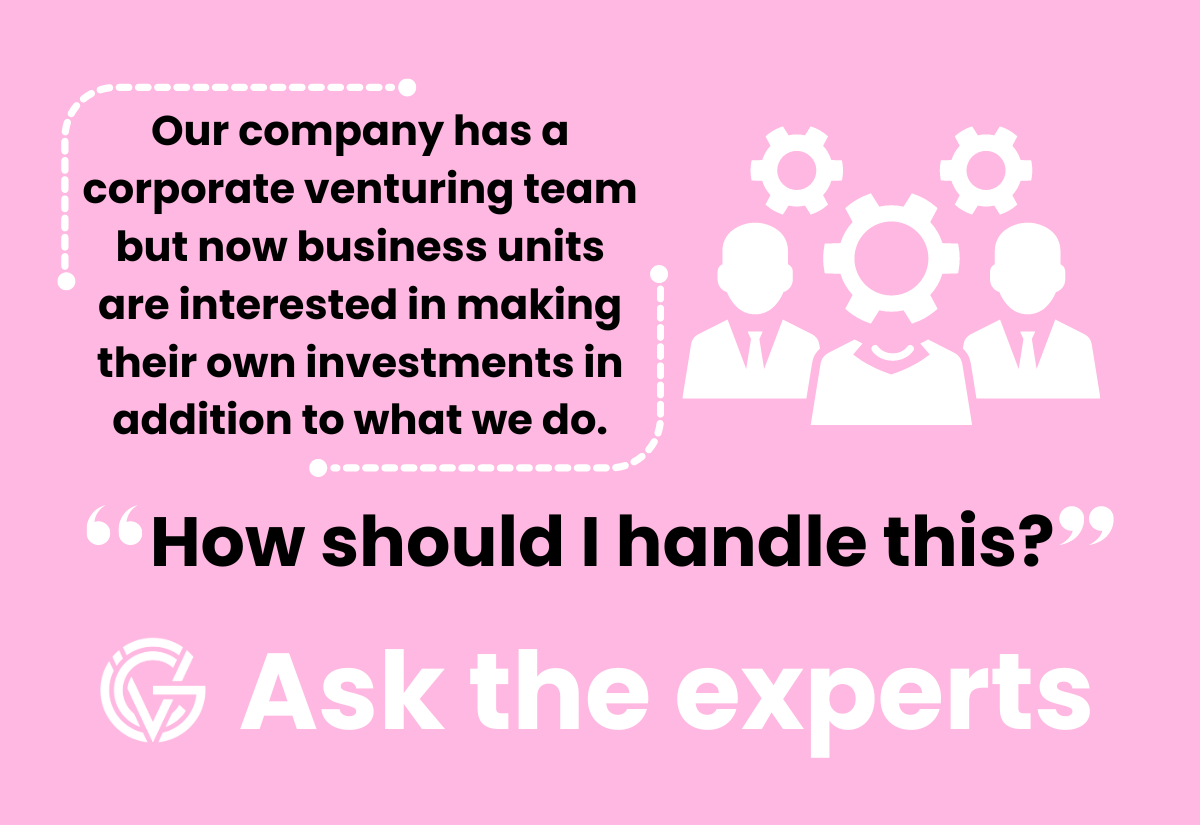Our monthly advice column in which an expert panel gives advice on common problems in corporate venturing.

This is a monthly column in which readers can ask our network of experienced corporate venturing professionals about how to handle the common dilemmas of CVC practice.
If you would like to submit a question email us here.
The question:
“Our company has a corporate venturing team but business units are interested in making their own investments in addition to what we do. How should I handle these additional investment plans?”
The expert views:

There is no simple answer here, as it will likely be situation dependent. While not ideal, there can be good reasons for business units doing their own balance sheet investments. And centralising those investments is not always the right answer, particularly if those investments would count towards your returns.
Aside from managing the internal politics of the situation, it would be important to engage your legal counsel to ensure there are appropriate controls and governance around all equity investing efforts as conflicts of interest can arise without them.
Engaging with your finance and audit teams will also be important to ensure the organisation is being consistent in terms of how investments are valued and managed.
And finally, thinking through internal and external messaging will be important, as founders and potential syndicate partners find it confusing if there are multiple points of contact in an organisation.

This is a common challenge at many corporations and one that comes up in Institute course discussions.
On the one hand, it’s good to have a venture investing ‘center of excellence’ (the CVC unit) for managing these transactions as it reduces corporate reputation risk related to understanding of the VC ‘rules of the game.’ But it can be onerous for the CVC team if faced with a stream of questionable ad hoc investments to execute…and even worse if the CVC is measured on the financial performance of those investments!
Therefore, I’ve found it to be important to articulate (and even document e.g. in an letter of intent) the roles and terms and conditions of this investment ‘service provider’ role:
■ Does the CVC team provide venturing education/resources (common language and context, resources) for business units who might want to invest?
■ Are there designated owners for this activity within the business units?
■ Does the CVC team facilitate investment theme development (or just execute on ad hoc deals)?
■ How does the deal management process work (respective roles, steps, tools, guidelines)?
■ Who manages the investments (board/observer seat holders)?
■ Are the investments tracked and reported on within the CVC portfolio (ring-fenced)?
■ How is this service provider support for business unit investments resourced and compensated?
If you would like more guidance on issues like this, the GCV Institute runs professional training courses for corporate investors. Find out more here.

PayPal Ventures has established some rules of engagement so we don’t get situations where C-suite leaders are telling us to do certain deals. But we have done a couple of investments outside of the ventures team by the corporate development team. When it happens, my team supports it as investment experts. What we do is give an honest assessment of whether it is venture investable.
If it is bad, we say no to doing the deal. If it’s a really great investment, we’ll steal it and pull it into the venture portfolio.
Then there are those that are middle of the road. We might say that the startup is not venture investable, meaning that we don’t think you are likely to make a lot of money on this. So there has to be a strategic extra reason for doing the deal.
Saying that puts the correct among of pressure on making sure there is a strategic outcome. You need to pressure test that because if you’re not confident in the financial return, then you need to be confident in the strategic value. If you’re confident of neither, you shouldn’t do it. As a result we do very, very few deals like this. Two that I can think of, one has worked out financially and one hasn’t but both have done what they were expected to strategically.
When these investments go ahead, we’ll help the teams by managing the investment aspects — we like to be helpful — but we want the business units to manage the relationship with the startup.
Would you like to be on our panel of experts? We are building a group of experienced people we can tap for answers to these reader questions. If you’d be happy to contribute your advice, please get in touch!

Maija Palmer
Maija Palmer is editor of Global Venturing and puts together the weekly email newsletter (sign up here for free).








